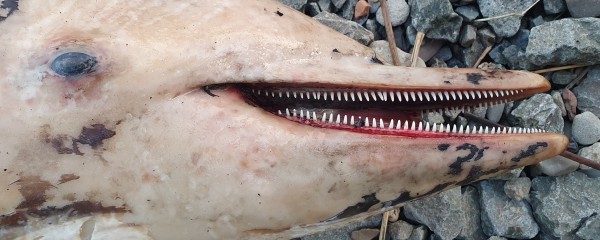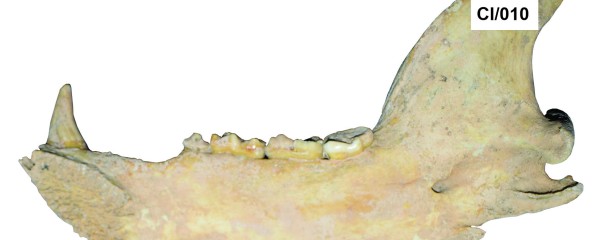Orca stranding on the Belgian coast

On October 29, a male orca was spotted off the coast of Coxyde, the first confirmed case of this species in Belgium in the 21st century. A few hours later, the severely weakened animal washed up in De Panne, where it died almost immediately. The autopsy took place on the beach on October 30. To what extent the weakening and death of the orca should be associated with old age or health problems remained unclear. The origin of the animal is also not yet known.
In the morning of Sunday, October 29, a large but unidentified sea animal was spotted on the border of Nieuwpoort and Oostduinkerke. A little later, Laurent Raty noticed the large sword-shaped dorsal fin of a marine mammal off the coast of Coxyde. It was immediately clear that it could only fit a male orca (also called killer whale). The animal moved slowly southwest along the coast and news spread quickly.

When, an hour later, it appeared that the orca had meanwhile barely moved on to off Saint-Idesbald, and was lingering there, hundreds of spectators rushed to the shore hoping to catch a glimpse of the animal. This did not prove difficult, as the flat sea made the orca visible from afar. However, the animal also sometimes approached to within just a few dozen metres of the tide line.

Inevitable stranding
Lots of 'oohs and ahhs', but the apearance of this orca in the southern North Sea, its slow swimming and dangerously close approach to the shoreline were bad signs. The euphoria quickly turned when it became clear that the animal would wash up with the rising tide. An ultimate attempt by the lifeboat Brandaris (Ship Support, Nieuwpoort) to encourage the orca to choose open sea had no effect.

At a quarter past two in the afternoon, the orca washed ashore in De Panne, just across the border with Saint-Idesbald. Once the tide had gone out, the very skinny animal died almost immediately. Apart from its weakened condition, the loss of the supporting power of the water also plays a role. On dry land, the pressure of its own weight on organs, blood circulation and respiration quickly becomes too great.

Autopsy
Because of the size of the animal - 6.13 m long - and the desire to keep the body as intact as possible for the autopsy, and also to preserve the skeleton, it was decided to organise the investigation into the medical background and cause of death of the orca on site.
The autopsy was performed on Monday morning, 30 October, by staff from the faculties of veterinary medicine at Ghent University and Université de Liège and the Institute of Natural Sciences. The general public could follow the event, which took about three hours, from a distance. All body parts and organs were inspected externally and internally, and various tissue samples were collected for further microbiological (diseases) and ecotoxicological (chemical contamination) studies.

Cause of death?
Analysis of the digestive system showed that the stomach and intestines were completely empty, meaning that the animal had not managed to obtain food for some time. The thin layer of subcutaneous fat and severely worn teeth also seem to be related to this. These findings are consistent with the externally observed emaciation and weakening of the animal.
Inspection of the other organs revealed signs of infection of the lymphatic system, and minor bleedings in the intestinal wall. The severity and role of these in the weakening and death of the orca are being further investigated microbiologically. The other organs showed no visible signs of infection or obvious pathology. No suspicious amount of internal or external parasites was found either.
The extent to which the orca's weakening and eventual stranding and death should be linked to advanced age (and natural death), underlying health problems, or a combination of both, is thus not yet fully established.

Orcas in Belgium
There are hardly any well-documented cases of orcas in Belgium from past centuries. Four reports are known from the 20th century, and for an older stranding we need to move back in time to 1850. More recent cases (including some reported in 2022) could not be sufficiently documented to be retained as certain. The animal of 29 October 2023 thus concerns the first confirmed orca in Belgium in the 21st century. In the meantime, it became known that he was also filmed on Friday, October 27, from a tugboat near Wimereux, France.
Although an orca also washed ashore in Cadzand (The Netherlands) in October 2022, an orca was found in the French river Seine in May of the same year (neither of which survived), and other rare and unexpected marine mammals turned up in the southern North Sea in recent years, we should be cautious in interpreting these figures because of the low numbers. The same goes for pointing out causes for the appearance of these species in areas where they do not normally occur.
Origin
The origin of the Belgian orca also remains unknown for now. The orca is a cosmopolitan species, meaning it can be found all over the world, but usually lives in populations that are more or less resident within well-defined areas (which can be quite large). The southern North Sea has no local population; the closest orcas live in Scotland, Norway and the southern part of the Bay of Biscay (N Spain).
Orca populations are invariably well monitored by local scientists, and individuals are usually known and documented in photo databases. Individual recognition is thereby often possible based on markings, fin shape and any damage and scars. The orca from the Belgian coast is currently being compared with photos from these databases. So far, no similarities were found with orcas from the Iberian Peninsula (Spain - Portugal), Madeira, Scotland and Ireland. A possible origin from populations of Norway, Iceland and the Azores is still being investigated further.
Acknowledgements
An explicit word of thanks goes to the local police and fire brigade, the city services of De Panne, the rescue services, the civil protection, the staff of Ghent University and the Université de Liège, the colleagues from the Institute of Natural Sciences and the FPS Public Health, Safety of the Food Chain and Environment, and to the numerous volunteers and other stakeholders who played a role in monitoring and documenting the orca, managing the beaching, the public and the autopsy.
The municipality of De Panne gave the unfortunate orca the name 'Reveil', after the initiative that aims to take Flemish mourning culture into the 21st century and of which De Panne may call itself 'consolation capital' in 2023. On the eve of the orca's stranding, 10,000 candles were placed on De Panne's beach in this context.


